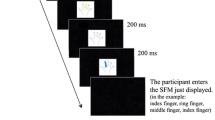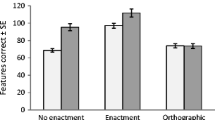Summary
Three experiments investigated whether learning action phrases by enacting the denoted action enhances organization or not. In the first experiment it was shown that, compared to a standard learning instruction, enacting did not enhance the clustering of episodic and taxonomic lists, but it did enhance memory performance. Furthermore, the enacting effect was strongest with an unrelated list; in all lists, organization and recall correlated only under a verbal instruction and not under an enacting instruction. In the second experiment, subjects were also informed about the categories of the lists and instructed to use them to learn the items. The organization was enhanced in all cases by this procedure, but the recall performance was enhanced only with a standard learning instruction. Under enacting, information about the categories had no influence. In the third experiment this effect was replicated for a taxonomic list and could be generalized for a motor list, in which categories were in accordance with the similarities of the movement pattern. Here too the explicit category information had an effect only under a standard learning instruction, but not with enacting. We interpret these effects as support for the assumption that enacting does not enhance memory performance by better relational information. Relational information is, on the contrary, less important for recall under enacting than under a standard learning instruction.
Similar content being viewed by others
References
Bäckman, L., & Nilsson, L.-G. (1984). Aging effects in free recall: An exception to the rule. Human Learning, 3, 53–69.
Bäckman, L., Nilsson, L.-G. & Chalom, D. (1986). New evidence on the nature of the encoding of action events. Memory & Cognition, 14, 339–346.
Begg, I. (1983). Imagery instructions and the organization of memory. In J. C. Yuille (Ed.), Imagery, memory and cognition. Hillsdale, NJ: Lawrence Erlbaum.
Belezza, F. S., Richards, D. L., & Geiselman, R. E. (1976). Semantic processing and organization in free recall. Memory & Cognition, 415–421.
Bousfield, W. A. (1953). The occurrence of clustering in the recall of randomly arranged associates. Journal of Genetic Psychology, 49, 229–240.
Bower, G. H. (1970). Imagery as a relational organizer in associative learning. Journal of Verbal Learning and Verbal Behavior, 9, 529–533.
Bower, G. H., Clark, M. C., Lesgold, A. M., & Winzenz, D. (1969). Hierarchical retrieval schemes in recalling categorized word lists. Journal of Verbal Learning and Verbal Behavior, 8, 323–343.
Cohen, R. L. (1983). The effect of encoding variables on the free recall of words and action events. Memory & Cognition, 11, 575–582.
Cohen, R. L. (1985). On the generality of the laws of memory. In L. G. Nilsson & T. Archer (Eds.), Animal learning and human memory. Hillsdale, NJ: Erlbaum.
Cohen, R. L., & Stewart, M. (1982). How to avoid developmental effects on free recall. Scandinavian Journal of Psychology, 23, 9–16.
Engelkamp, J. (1986a). Differences between imaginal and motor encoding. In F. Klix & H. Hagendorf (Eds.), Human memory and cognitive capabilities (pp. 205–213). Amsterdam: Elsevier (North-Holland).
Engelkamp, J. (1986b). Nouns and verbs in paired-associate learning: Instructional effects. Psychological Research, 48, 153–159.
Engelkamp, J. (1988). Nouns and verbs in the mental lexicon. In W. Hullen & R. Schulz (Eds.), Understanding the lexicon: Meaning, sense and world knowledge in lexical semantics (pp. 303–313). Tübingen: Niemeyer.
Engelkamp, J., & Krumnacker, H. (1980). Imaginale und motorische Prozesse beim Behalten verbalen Materials. Zeitschrift für experimentelle und angewandte Psychologie, 27, 511–533.
Engelkamp, J., & Zimmer, H. D. (1984). Motor program information as a separable memory unit. Psychological Research, 46, 283–299.
Helstrup, T. (1987). One, two, or three memories? A problem-solving approach to memory for performed acts. Acta Psychologica, 66, 37–68.
Hunt, R. R., & Einstein, G. O. (1981). Relational and item-specific information in memory. Journal of Verbal Learning and Verbal Behavior, 20, 497–514.
Hunt, R. R., & Seta, C. E. (1984). Category size effects in recall: The roles of relational and individual item information. Journal of Experimental Psychology, 10, 454–464.
Huttenlocher, J., & Lui, F. (1979). The semantic organization of some simple nouns and verbs. Journal of Verbal Learning and Verbal Behavior, 18, 141–162.
Jacoby, L. L., & Craik, F. I. M. (1979). Effects of elaboration of processing at encoding and retrieval: Trace distinctiveness and recovery of initial context. In L. S. Cermak & F. I. M. Craik, Levels of processing in human memory. Hillsdale, NJ: Erlbaum.
Kausler, D. H., & Hakami, M. K. (1983). Memory for activities: Adult age differences and intentionality. Developmental Psychology, 19, 889–894.
Kieras, D. (1978). Beyond pictures and words: Alternative information-processing models for imagery effects in verbal memory. Psychological Bulletin, 85, 532–554.
Marschark, M. (1985). Imagery and organisation in the recall of prose. Journal of Memory and Language, 24, 734–745.
Mohr, G., Engelkamp, J., & Zimmer, H. D. (1989). Recall and recognition of self-performed actions. Psychological Research, 51, (this issue)
Nilsson, L. G., & Cohen, R. L. (1988). Enrichment and generation in the recall of enacted and non-enacted instructions. In M. M. Gruneberg, P. E. Morris, & R. N. Sykes (Eds.), Practical aspects of memory: Current research and issues (pp. 427–432). Chichester: John Wiley & Sons.
Perrig, W. (1988). Image versus motor encoding. In M. Denis, J. Engelkamp, & T. E. Richardson (Eds.), Cognitive and neuropsychological approaches to mental imagery (pp. 307–316). Dordrecht: Nijhoff.
Puff, C. R. (Ed.) (1979). Memory organization and structure. New York: Academic Press.
Sternberg, R. J., & Tulving, E. (1977). The measurement of subjective organization in free recall. Psychological Bulletin, 84, 539–556.
Tulving, E. (1962). Subjective organization in free recall of unrelated words. Psychological Review, 69, 344–354.
Wippich, W. (1980). Bildhaftigkeit und Organisation: Untersuchungen zu einer differenzierten Organisationshypothese. Darmstadt: Steinkopff.
Zimmer, H. D. (1984). tEnkodierung, Rekodierung, Retrieval und die Aktivation motorischer Programme (Arbeiten der FR Psychologie Nr. 91). Saarbrücken: Universität des Saarlandes.
Zimmer, H. D. (1989). Visuelle und semantische Merkmale im Recall. Sprache und Kognition, 8, 115–125.
Zimmer, H. D., & Engelkamp, J. (1985). An attempt to distinguish between kinematic and motor memory components. Acta Psychologica, 58, 81–106.
Zimmer, H. D., & Engelkamp, J. (1989). One, two or three memories: Some comments and new findings. Acta Psychologica 70, 293–304.
Zimmer, H. D., Engelkamp, J., Mohr, M., & Mohr, G. (1988). Organisation und Behalten im multimodalen Modell. (Arbeiten der Fachrichtung Psychologie Nr. 125) Saarbrücken: Universität des Saarlandes.
Zimmer, H. D., & Mohr, M. (1986). Organisation und Organisierbarkeit von Verben und Substantiven bei einer verbalsemantischen bzw. “modalitätsspezifischen” Lernweise (Arbeiten der Fachrichtung Psychologie Nr. 100). Saarbrücken: Universität des Saarlandes.
Author information
Authors and Affiliations
Rights and permissions
About this article
Cite this article
Zimmer, H.D., Engelkamp, J. Does motor encoding enhance relational information?. Psychol. Res 51, 158–167 (1989). https://doi.org/10.1007/BF00309143
Issue Date:
DOI: https://doi.org/10.1007/BF00309143




